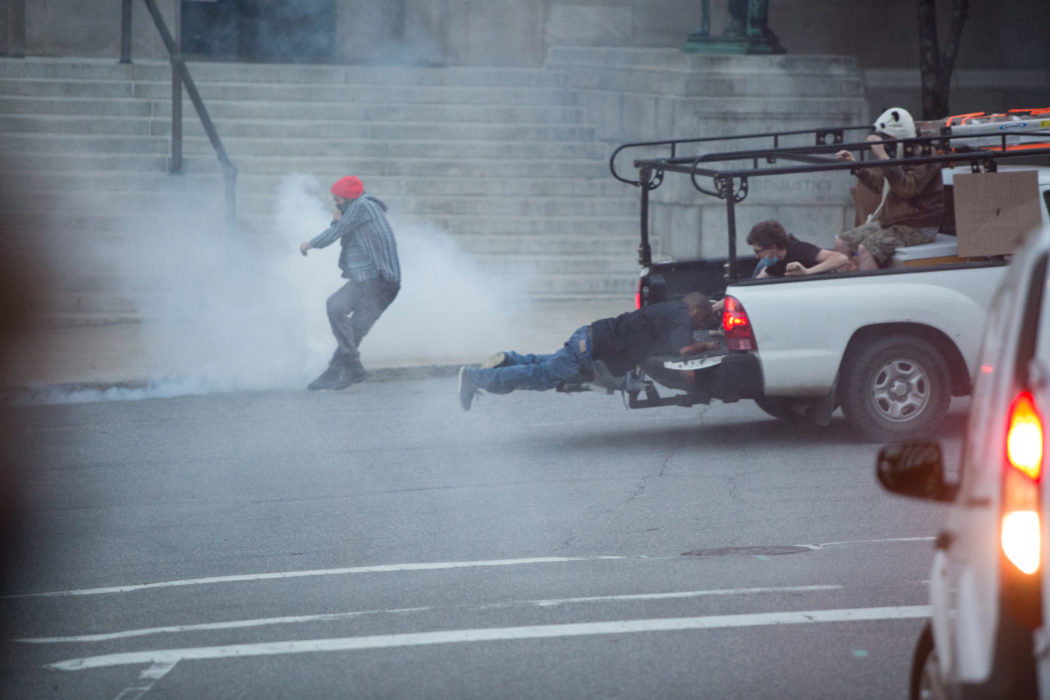This article was published with permission from Carolina Public Press.

As police release tear gas to disperse protesters in downtown Asheville on June 3, one man dives into the back of a moving truck and another staggers in a cloud of the gas. Colby Rabon / Carolina Public Press
As calls for police accountability sweep the nation, more people are interested in understanding how to find out whether law enforcement officers in their communities have been accused of misconduct.
However, even getting something as simple as a police report in North Carolina can be up for interpretation, and many agencies err on the side of opacity, said Mike Tadych, a lawyer who represents media organizations in public records lawsuits.
State law says records of criminal investigations are not public records; however, some basic information contained within the reports is public.
“The interpretation of what is a record of a criminal investigation varies based on who is looking at it,” Tadych said.
Police investigation exemptions
Law enforcement agencies rely on many of the records listed below in a variety of investigations. However, just because they are used that way doesn’t mean records cannot be released to the public. If the records were public before the investigation — such as a jail arrest record, incident report or 911 call — they remain public records during an investigation, Tadych said.
In one unsolved murder, the death of Faith Hedgepeth in Chapel Hill, police have largely refused to release records and sealed search warrants because they say they are still investigating the case, Tadych said.
“It’s a bunch of magic buzzwords that ‘This will harm the pending investigation,’ but they don’t say how or why,” Tadych said.
Be prepared for different agencies to have different interpretations of the law — and ask the agency to reconsider if it says the records are not public.
Police reports on incidents and arrests
From pulling someone over for a broken taillight to a report of an assault, the job of policing relies on a large amount of paperwork.
“The police will sometimes say, ‘We will give you an incident report.’ Most incident reports are two pages,” Tadych said.
However, if there is an ongoing criminal investigation, police sometimes will not release the entire report, especially the narrative, or description, of what happened.
That information, even if in a protected report, remains public, state law says. Sometimes that means asking precisely — for the public information rather than a records request. That information includes:
- The time, date, location and nature of the apparent violation reported to a public law enforcement agency.
- Information about the person charged or indicted.
- Why and where the person was arrested, including whether the person resisted police, possessed or used weapons, and a description of anything seized related to the arrest.
“The biggest fight is the narrative in the incident report is often withheld,” Tadych said. “They basically will say the front page gives you all of that information.”
But the narrative will explain exactly what happened, according to the officer who wrote the report, he said.
While some agencies resist releasing narratives, oftentimes departments will release reports in full.
In many jurisdictions, members of the public can request incident reports directly from law enforcement agencies by visiting the related website and filling out a form. If there is no obvious way to file a request online, call the police or sheriff’s department and ask how to submit a request. Oftentimes, it can be done with an email to the correct public official.
Jail records
After an arrest, law enforcement typically transports that person to the local county jail. Many county jails maintain rosters of current inmates on their websites. Jail booking records typically include the name of the arrested person, a mugshot, which agency arrested the suspect, why and when the suspect was booked into the jail, the case number and more.
Even when they are not posted on the internet, records of jail bookings are public. Several counties in North Carolina allow users to search online jail rosters, including Mecklenburg, Wake, Henderson and many others. But in many counties, users may have to file a records request to get this information or details about past jail stays.
Sheriff’s offices typically provide information about jail inmates with little trouble and often for free. But we have 100 counties in North Carolina, each with its own sheriff. Some agencies at times have been less cooperative with providing this information in a timely manner.
911 calls
State law says the contents of 911 calls are public records, except when the information can reveal the caller’s identity.
In such cases, agencies that hold 911 recordings can instead provide a transcript of the call or alter the voice of the caller. Not every agency will alter the voices in a 911 call.
Police misconduct and discipline records
This can get complicated because several state laws could apply, and Tadych said agencies often resist disclosing records about employee discipline.
The records of people working for public agencies in North Carolina are largely shielded from public view except for routine information: The name, age and date of employment for people working for taxpayer-funded agencies are considered public, as are current position, compensation and dates of salary increases. The reasons for dismissals and demotions are public record.
In North Carolina, letters of resignation are not public records, but in some cases, the agency can release the record if the integrity of the department is at stake. Employees can also release the letter on their own.
Officials often say records of employee conduct fall under the state’s broad shield against releasing personnel records, Tadych said. A little-used provision allows agencies to release records if officials feel it is in the public interest to do so.
“They can release this information when the integrity of the department is called into question,” Tadych said.
The process can involve writing a memo to explain why the records will be released.
“It is tradition not to (release records),” Tadych said. “I think that’s a problem.”
Police dashcam and body camera footage
State law says law enforcement video recordings are not public records. However, that doesn’t mean you can’t ever get them.
To get a copy of a recording, Tadych said, people need to fill out a form with the Administrative Offices of the Court and file it in Superior Court. Once the requester petitions a judge for its release, the judge will review it privately. In addition, everyone who is in the video will have an opportunity to tell the court why the video should not be released.
“There have been times where individual police officers have said they don’t want this released, and the situation has been so egregious and receiving so much attention, and the judge releases it,” Tadych said.
Dealing with redactions and how to appeal
An agency cannot charge a fee for the time it takes to redact documents, Tadych said.
“As the requester, you do not have to pay for their time to unscramble that which is public from that which is confidential,” Tadych said. “The law is crystal clear. That is on the public agency.”
When a requester doesn’t get the records he or she wants — there are too many redactions, the agency denies the request or the requester believes there are more records — the person seeking the records can always ask the agency to reconsider.
Other than asking nicely or bringing the agency’s refusal to cooperate to the attention of the news media, the only other recourse in North Carolina is to sue the agency in court.
This article was published with permission from Carolina Public Press.

There are no comments
Add yours